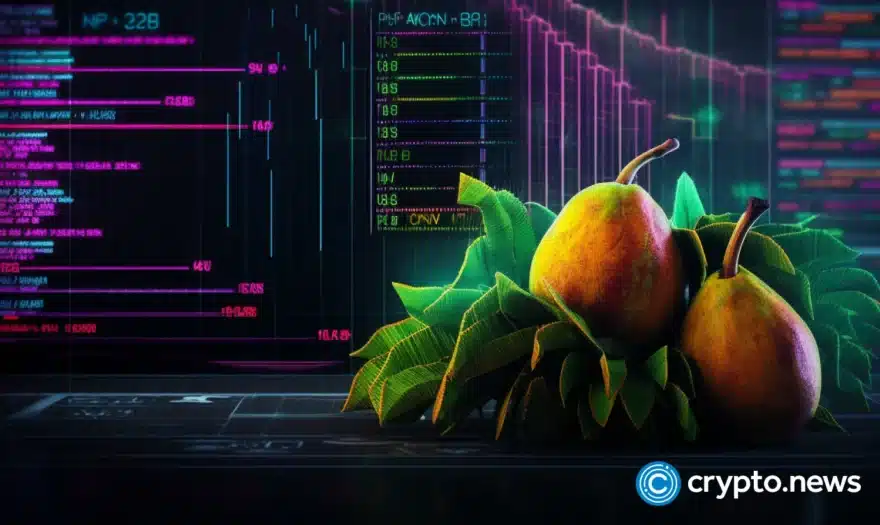What Do Free Markets Advocates Think About Bitcoin?
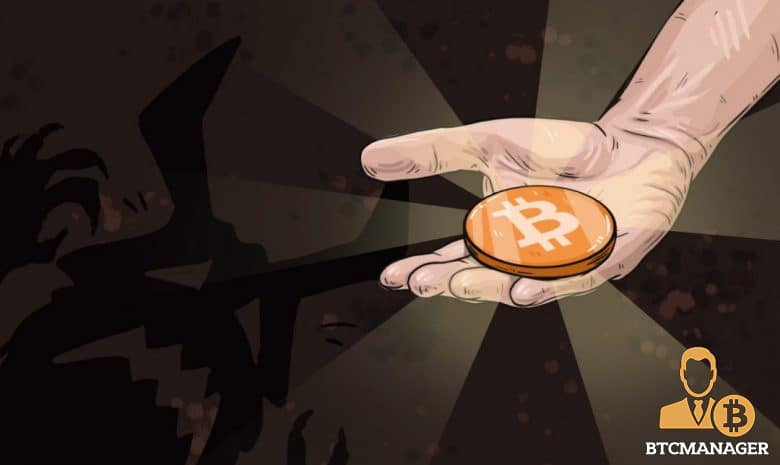
What libertarians, anarcho-capitalists, and proponents of the Austrian school of economics, all have in common is their love for free markets and disdain for state intervention.
Many evangelists of these schools of thought have thus publicly praised decentralized digital currencies, such as bitcoin, as they provide individuals with personal financial sovereignty and allows them to store their wealth in an asset whose value cannot be controlled by the actions of central banks. However, not all free market advocates believe that bitcoin should have a valid place in the economy.
What are “Free Markets?”
In economics, the term “free markets” refers to an economic system where prices for goods and services are determined purely by market forces – driven by consumers and the open market – without any government interference on pricing or market structure.
A free market economy is based on a spontaneous order of arrangements where individuals decide to engage in voluntary economic activity without the control of central governing authorities. This creates unobstructed competition, which – in theory – should allow for fair pricing and the most possible wealth for the highest amount of people within this economy.
Who Said What About Bitcoin?
While bitcoin – and cryptocurrency in general – fit into the free market spirit, opinions about its validity as money differ among leading figures in the libertarian and anarcho-capitalist realm.
Ron Paul
Ron Paul is an author and former politician who has established himself as the most influential libertarian thought leader in the U.S. after having run for the U.S. Presidency three times during his active political careers. He is an advocate for the Austrian school of economics and a Senior Fellow of the Mises Institute and has been very outspoken about why the Federal Reserve should be abolished, most notably in his book End the Fed.
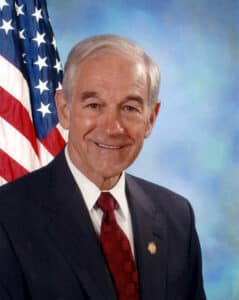
(Source: Wikipedia)
Ron Paul has also publicly stated his view on bitcoin and cryptocurrencies on several occasions.
In 2013, he told CNN: “There will be alternatives to the dollar, and [bitcoin] might be one of them.” If bitcoin mass adoption will take place, “it’ll go down in history as the destroyer of the dollar,” he added.
In November 2017, Paul even starred in an advert for CoinIRA, where he stated: “As a firm believer in currency competition, I’m excited to see the options that bitcoin opens up.”
Having said that, Ron Paul remains skeptical about bitcoin functioning as currency effectively as he believes that money has historically always been something tangible. In January 2018, he explained that individuals should have the right to choose what currency they want to use but said that it ought to be something tangible.
He also considers the current valuations of cryptocurrencies to be in bubble territory. In December 2017, he told CNBC cryptocurrencies are a reflection of the disaster of the money dollar systems and that the high price of bitcoin has been partly caused by loose monetary policy, in the same way as other asset bubbles have in the recent past.
Doug Casey
Doug Casey is an anarcho-capitalist writer, an investor, and CEO of investment research firm Casey Research. While Casey was originally skeptical about decentralized digital currencies, he has since changed his mind and has become a firm believer in the value of bitcoin and cryptocurrencies.
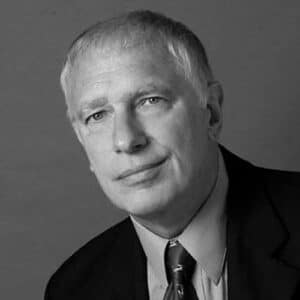
(Source: Casey Research)
In a blog post titled “How I Learned to Love Bitcoin,” Casey stated:
“My original objection was that Bitcoin isn’t backed by anything. It’s really a private fiat currency. It’s very much like the Zambian Kwacha, the Argentine peso, the US dollar, or any of the other 150-plus currencies in today’s world. It’s a floating abstraction. Unlike state currencies, though, its acceptance isn’t enforced by laws.” Casey, therefore, believes that “Bitcoin is well on the way to being accepted as money. I think it will succeed.”
While he considers bitcoin as another form of fiat currency, he is not sure if it will stand the test of time.
“Bitcoin passes the medium of exchange test for the moment and store of value test for the moment. So you can definitely say it’s money—for the moment. I have little confidence, however, Bitcoin will be here, say, five years from now. Buying cryptos is not like socking away gold coins,” Casey added.
Robert Murphy
Robert Murphy is an anarcho-capitalist writer and scholar at the Mises Institute. In 2015, he co-authored the book Understanding Bitcoin: The Liberty Lover’s Guide to the Mechanics & Economics of Crypto-Currencies and has been a supporter of bitcoin.
In an article for the Library of Economics and Liberty, Murphy wrote: “Bitcoin is an ingenious peer-to-peer ‘virtual’ or ‘digital currency’ that challenges the way economists have traditionally thought about money. Its inbuilt scarcity provides an assurance of purchasing power arguably safer than any other system yet conceived.” He added:
“Critics argue that because of its lack of commodity backing, Bitcoin is doomed to eventual failure. Yet the popular versions of these arguments either would apply just as well to gold or have already been proven wrong by the use of Bitcoin as a medium of exchange among a small (but growing) group of users.”

(Source: Wikipedia)
Having said that, like many of his “Austrian” peers, he also prefers gold over bitcoin.
“I still think that gold remains the preeminent money for humans at this stage of the globe’s economic development. If governments around the world got out of the way, humanity would (I predict) once again embrace gold, not Bitcoin, as the true free-market money. But this is just a personal judgment call. We need to let the decentralized market test tell us what is the best money, or monies,” Murphy concluded.
Konrad Graf
Konrad Graf is a writer and an economist who has written extensively on the topic of bitcoin monetary policy. He considers bitcoin to be one of the greatest inventions of our time and has shared his thoughts on the digital currency in essays such as “On the Origins of Bitcoin: Stages of Monetary Evolution,” and the “Bitcoin Decrypted Series,” as well as in his book Are Bitcoins Ownable? Property Rights, IP Wrongs, and Legal Theory Implications.

(Source: Konradsgraf.com)
In “On the Origins of Bitcoin,” Graf wrote: “Bitcoin was offered up as an invention/discovery of a new way to do something very old—transfer the control of purchasing power from one party to another. This method was offered for free to the entire human population. [Each] person remains entirely free to either ignore it or use it in some way, and only to the exact extent of each person’s willing participation.”
“Bitcoin is superior to any known alternative medium of exchange on just about every meaningfully relevant characteristic,” he added.
Jeffrey Tucker
Jeffrey Tucker is an Austrian school economist, author, and an anarcho-capitalist. He is the editorial director of the American Institute for Economic Research (AIER) and the CEO of the Atlanta Bitcoin Embassy.
Tucker has been a vocal supporter of bitcoin for several years and has spoken about the benefits of the virtual currency at numerous conferences. He is also the founder of the CryptoCurrency Conference and authored the book Bit by Bit in 2015.
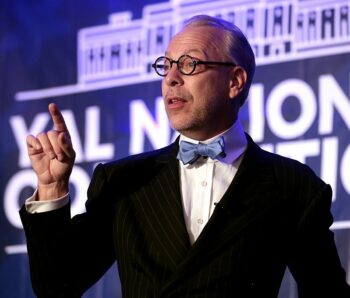
(Source: Wikipedia)
In a 2017 Op-Ed for Bitcoin Magazine, Tucker wrote: “There are dramatic challenges to the status quo that are being offered up by the advent of cryptocurrency. [The] new world will be financially sound, stable, radically disintermediated, decentralized and democratized because anyone, of any financial means and access to financial institutions, can participate within it.”
“We’ve only begun to think about what a radical change it would be if our money actually gained value over time (as crypto has for nine years, and the dollar did in the late 19th century), so that you actually grow more wealthy merely by not spending. Such a change would be huge, not only for finance but also for the culture at large,” he added.
Kevin Dowd
Kevin Dowd is a professor of finance and economics at Durham University, England. He is a long-standing free market economist with interests in private money, financial and macroeconomics and political economy. He has also co-authored the book Alchemists of Loss: How Modern Finance and Government Intervention Crashed the Financial System.
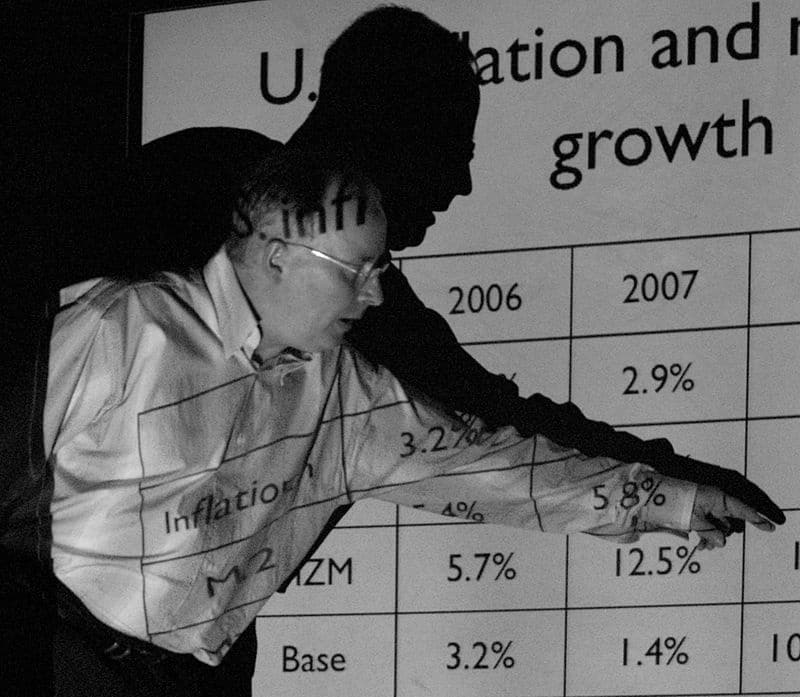
(Source: Wikipedia)
In 2014, Dowd published a paper for the Institute of Economic Affairs in which he argued that governments should not stifle currency competition and provide a level playing field for private money such as bitcoin so that citizens have the ability to choose which currency they want to use.
He told The Guardian: “Let’s suppose that bitcoin became a very prominent currency. [To ensure a level playing field], the government itself would accept bitcoin in tax payments. So, in effect, the government should not be favoring its own currency, or any particular currency, through any of its unique powers. Nor have regulations against them.
Bryan Caplan
Bryan Caplan is a professor of Economics at George Mason University and considers himself an anarcho-capitalist. He regularly contributes articles to the Library of Economics and Liberty and has authored several books including The Myth of the Rational Voter: Why Democracies Choose Bad Policies and The Case Against Education: Why the Education System Is a Waste of Time and Money.

(Source: bcaplan.com)
In a Reddit AMA in 2014, Caplan was asked what his thoughts on bitcoin’s validity as money. His response was:
“It’s done 10x better than I expected, but I still don’t expect it to be more than a niche financial instrument. It’s long been noted that people around the world continue using their national currencies even in the face of 20 or 30 [percent] inflation because national currencies are more convenient and focal. Also, I expect regulators to crack down if Bitcoin becomes much of a threat. But hopefully I’m wrong!”
Peter Schiff
Peter Schiff is an economist, a financial commentator, and CEO of stock brokerage Euro Pacific Capital. He is also one of the most outspoken bitcoin critics among libertarian thought leaders.
Schiff believes that bitcoin is not the money of the future because money needs to be a commodity. He has defended this view in heated discussions with bitcoin advocates such as CNBC Fast Money’s Brian Kelly and Coin Center’s Peter Van Valkenburgh.
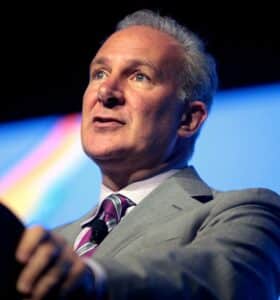
(Source: Wikipedia)
Schiff also believes that bitcoin is the biggest bubble he has ever seen. “[Bitcoin] a speculative asset at best, but anybody who buys it runs the risk that the price could collapse any day. Sure, it could keep going up, but eventually it’s going to implode, so you really can’t say it’s a safe haven. It’s a highly speculative asset. The underlying concept is not entirely meritless, though. I think bitcoin was born as a solution to a real problem but I think unfortunately this is not the solution,” he told Benzinga.
Walter Block
Walter Block is another Austrian school economist and an advocate of anarcho-capitalism. He is a Senior Fellow of Mises Institute and is well-known for his book Defending the Undefendable, which he published it 1976.
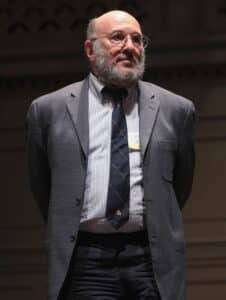
(Source: Wikipedia)
Block is not a fan of bitcoin. In 2011, he said: ”I’m not sure I fully understand [bitcoin]. But, I favor money based on real commodities (gold, silver, whatever the market settles upon), and, I gather, bitcoins do not qualify. So, I oppose bitcoins. I favor 100 [percent] backed (by a commodity) currency for reasons that Rothbard and Mises have written about, over and over again.”
Gary North
Gary North is an economic historian, an author, and another Austrian economist who has little love for bitcoin.
In an article titled “Is Bitcoin a Ponzi Scheme” that North wrote for LewRockwell.com, he states: “I hereby make a prediction: Bitcoins will go down in history as the most spectacular private Ponzi scheme in history. It will dwarf anything dreamed of by Bernard Madoff.”
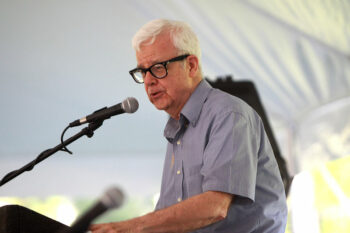
(Source: Wikipedia)
“Bitcoins cannot possibly fulfill their supposed purpose: to serve as an unregulated currency unit. Bitcoins are not an alternative currency. They are something you buy in the midst of a mania, and you will sell at some point in order to get back your money. You are thinking of buying Bitcoins, not because Bitcoins will serve as a means of exchange, as originally argued, but because you want to get back lots more money than you paid for them,” North concluded.
Hans-Hermann Hoppe
Hans-Hermann Hoppe is an Austrian school economist and an anarcho-capitalist philosopher. He is also a Senior Fellow at the Mises Institute and the founder of the Property and Freedom Society.
In 2013, Hoppe was asked by Stephan Kinsella what he thought of bitcoin. He told Kinsella that he does not consider bitcoin to be money.

(Source: Wikipedia)
However, Hoppe is strongly in favor of the decentralization that blockchain technology brings. In an interview with Polish media outlet Najwy?szy Czas!, he said: “Don’t put your trust in democracy, but neither should you trust in a dictatorship. Rather, put your hope into radical political decentralization.”
Why Aren’t All Free Markets Proponents in Love with Bitcoin?
In may come as somewhat of a surprise that a fair share of free-market advocates are not supportive of bitcoin, and cryptocurrency in general, despite the fact that it ticks so many free-market boxes.
Bitcoin acts both as a digital currency and as a store of value that cannot be censored, easily confiscated or directly influenced by a government or central banks. Its price is based purely on supply and demand market forces and anyone in the world with an Internet connection has the ability to partake in the Bitcoin network and transact in the digital currency.
While governments can and, in some cases, have attempted to ban bitcoin, it is de facto impossible to do so due to the decentralized nature of the Bitcoin network, which spans thousands of nodes across the globe. Hence, even if a government did manage to shut down all nodes and miners in its jurisdiction, the Bitcoin network would continue to function via the continual operation of nodes based outside the country.
The most common criticism of bitcoin found among libertarian thought leaders is that it is not backed by “real” commodities, such as gold and silver, and, thus, has no “real” value. Many free-market advocates are also believers in the gold standard, which is a monetary system where a currency is backed by gold reserves, and consider non-commodity backed mediums of exchange to be inferior.
This argument, however, can easily be refuted as bitcoin is backed by something “real.” Bitcoin is backed by hashing power which is provided by one of the largest networks of computers in the world.
While bitcoin may be a bit more challenging to comprehend and conceptualize for some, it carries all the essential traits that free market economics, libertarians, and anarcho-capitalists look for as an alternative to fiat currency.
As the bitcoin ecosystem grows and its value as a spending currency (should the Lightning Network and other scaling solutions succeed) and as a digital gold-like store of value becomes increasingly more evident, it would not be a surprise for the list of bitcoin-skeptical free-market advocates to shorten significantly.



